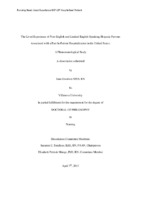The lived experience of non-English and limited English speaking Hispanic persons associated with a past in-patient hospitalization in the United States: A phenomenological study
View File(s)
Author Information
- Author(s)
- Details
-
Dr. Jana M. Goodwin, PhD, RN, CNE
- Sigma Affiliation
- Pi at-Large
Visitor Statistics
Visits vs Downloads
Visitors - World Map
Top Visiting Countries
| Country | Visits |
|---|
Top Visiting Cities
| City | Visits |
|---|
Visits (last 6 months)
Downloads (last 6 months)
Popular Works for Goodwin, Jana Michele by View
| Title | Page Views |
|---|
Popular Works for Goodwin, Jana Michele by Download
| Title | Downloads |
|---|
View Citations
Citations
The citations below are meant to be used as guidelines. Patrons must make any necessary corrections before using. Pay special attention to personal names, capitalization, and dates. Always consult appropriate citation style resources for the exact formatting and punctuation guidelines.
Item Information
Item Link - Use this link for citations and online mentions.
Abstract
The Hispanic population in the United States faces many challenges such as differences in language, culture, education, and socioeconomics. Research findings suggest that poor acculturation, language barriers and healthcare provider biases are associated with decreased access to care, lack of insurance or underinsurance, underutilization of services, feelings of isolation and powerlessness, which may lead to poor health outcomes. Some improvement in patient satisfaction, decreased rates of miscommunication and improved access to care has been noted with the implementation of the National CLAS standards. Findings from research studies conducted in the community and emergency settings suggest that patients’ perception of care can vary across healthcare settings and geographic locations. In the U.S., there is growing but limited research to the perceptions of the Hispanic non-English or limited English speaking persons related to an inpatient hospitalization experience. This is an important issue to address as patients with language barriers are vulnerable and the individual level support that may be experienced in community settings may not be present in the hospital. Furthermore, in order to close the disparity gap in quality of care, it is essential to examine the healthcare needs of patients at all healthcare settings.
This hermeneutical phenomenological study explored the lived experience of non-English and limited English speaking Hispanic persons associated with past in-patient hospitalization in the United States. Participants were recruited through purposive sampling from area community centers. The researcher conducted 11 participant interviews with non-English speaking and limited English speaking Hispanic persons. Data saturation was reached; six themes and 19 subthemes emerged from the analysis. This hermeneutical phenomenological study provides a voice for this population and contributes to the current body of nursing research.
Description
This dissertation has also been disseminated through the ProQuest Dissertations and Theses database. Dissertation/thesis number: 10062298; ProQuest document ID: 1776715633. The author still retains copyright.
Repository Posting Date
2020-02-20T16:09:17Z
Notes
This item has not gone through this repository's peer-review process, but has been accepted by the indicated university or college in partial fulfillment of the requirements for the specified degree.
Type Information
| Type | Dissertation |
| Acquisition | Proxy-submission |
| Review Type | None: Degree-based Submission |
| Format | Text-based Document |
Category Information
| Evidence Level | Phenomenology |
| Research Approach | Qualitative Research |
| Keywords | Latinx Patients; Nursing Non-English Speakers; Language Barriers |
Degree Information
| Grantor | Villanova University |
| Advisor | Smeltzer, Suzanne C. |
| Level | PhD |
| Year | 2015 |
Rights Holder
All rights reserved by the author(s) and/or publisher(s) listed in this item record unless relinquished in whole or part by a rights notation or a Creative Commons License present in this item record.
All permission requests should be directed accordingly and not to the Sigma Repository.
All submitting authors or publishers have affirmed that when using material in their work where they do not own copyright, they have obtained permission of the copyright holder prior to submission and the rights holder has been acknowledged as necessary.
Related items
Showing items related by title, author, creator and subjects.
-
Xhosa speaking nursing student's experiences of education in a language that's not their mother tongue
Espach, Juanita; Mlatsha, Ayanda (2016-07-13)Session presented on Saturday, July 23, 2016 and Sunday, July 24, 2016: Purpose: Nursing students attending any nursing school in South Africa are taught in English. A large percentage of students are second language ... -
A double-edged sword: Lived experiences of Hispanic/Latino nursing students who speak English as an additional language
Clark, Esmeralda A.As the population of the United States continues to become more diverse, the nursing profession is working toward diversifying its nursing workforce. Diversification of the nursing profession is linked to improved patient ... -
The lived experience of students as English language learners in the nursing classroom: A critical hermeneutic inquiry
Mulready-Shick, JoAnnThis qualitative study explored the lived experiences of students as English language learners in the nursing classroom. The study is a direct response to the under-representation of students from linguistically diverse ... -
Pilot test of a language-concordant health coaching intervention for limited English proficiency Latinx
Menon, UshaLanguage concordant health education may increase self-management and improve health outcomes for limited English-proficiency Latinx with Type 2 diabetes (T2D). We tested the effect of a language concordant health coaching ... -
The lived experience of adolescent females with diabetes: A phenomenological approach
Dickinson, Jane K.Adolescent females with type 1 diabetes are at risk for long-term complications including retinopathy, nephropathy, and neuropathy. Habits formed during this period can positively or negatively influence future health ...





